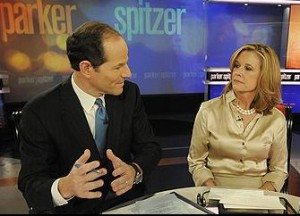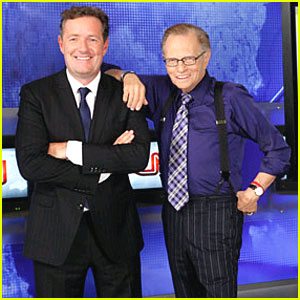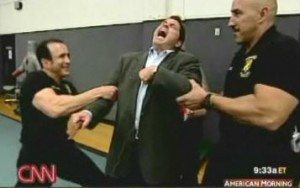 A disgraced ex-governor, a talent show host and an Oprah wannabe. Not a bad guest list for Letterman, perhaps, but as prime-time anchors on a cable news channel?
A disgraced ex-governor, a talent show host and an Oprah wannabe. Not a bad guest list for Letterman, perhaps, but as prime-time anchors on a cable news channel?
This is what’s become of CNN.
The one-time cable news leader has had a horrible year. Over the summer, viewership in prime time hit a 10-year low. “Larry King Live,” once the channel’s biggest draw, had lost almost half its audience from the year before. Bad enough that CNN has trailed Fox News Channel in the ratings in every part of the day for almost a decade; in prime time it’s now fallen behind MSNBC as well.
Something had to be done. But did it have to be this?
Pairing a man who was forced to resign in the midst of a prostitution scandal with an attractive blonde of a certain age isn’t inspired – it’s icky. As co-hosts of the new 8 p.m. talk show on CNN, former New York Gov. Eliot Spitzer and conservative columnist Kathleen Parker seem ill-suited for television, and for each other. If the goal was to bring back the point-counterpoint of “Crossfire” without all the cacophony, “Parker Spitzer” misses by a mile.
To rebuild an audience at 9 p.m., CNN is replacing Larry King in January with Piers Morgan, best known as one of the judges on NBC’s “America’s Got Talent.” His TV experience includes hosting an interview program on Britain’s ITV, and he has a background in journalism, something King couldn’t claim.  But there’s a catch. Morgan was the editor of a London tabloid when it published faked photos of British soldiers allegedly torturing Iraqi prisoners. He was fired after refusing to apologize. Now there’s a fine credential for a cable news host.
But there’s a catch. Morgan was the editor of a London tabloid when it published faked photos of British soldiers allegedly torturing Iraqi prisoners. He was fired after refusing to apologize. Now there’s a fine credential for a cable news host.
That leaves Anderson Cooper, who’s staying put at 10 p.m. CNN hopes that a stronger lead-in from Morgan will boost Cooper’s sagging ratings enough to pass the new Lawrence O’Donnell show on MSNBC. But hope isn’t confidence. Cooper plans to launch a syndicated daytime talk show next year when Oprah Winfrey moves to her own cable network. If that doesn’t smell like an exit strategy, I don’t know what does.
Whatever happened to the CNN where the news once mattered? Simply put, it failed miserably in prime time. While CNN tried to sail down the middle, sharp-edged opinion won out for Fox on the right, and MSNBC tacked left to pull into second place. Having finally embraced its liberal identity with the slightly goofy new slogan “Lean Forward,” a profitable MSNBC is now in position to beat CNN across the board when the final 2010 numbers are counted. “When you’re clear about who you are, you actually make money,” MSNBC’s chief marketing officer, Sharon Otterman, told the New York Times.
The 8 p.m. hour has been CNN’s weakest link. First Paula Zahn and then Campbell Brown just could not compete against Bill O’Reilly on Fox, Keith Olbermann on MSNBC and Nancy Grace on HLN. “Shedding my own journalistic skin to try to inhabit the kind of persona that might co-exist in that line up is simply impossible for me,” Brown wrote this spring. CNN still makes a healthy profit, thanks to its worldwide reach. It supports one of the largest newsgathering staffs at any network. But unlike its rivals, it lacks clarity of purpose.
The same company that at long last put award-winning correspondent Candy Crowley in charge of a Sunday talk show also put up with the empty-headed  Rick Sanchez for years. No one seemed to mind when he staged silly stunts like getting Tasered on the air and when he repeatedly got his facts wrong. He was fired in October only after publicly accusing his CNN bosses and Comedy Central’s Jon Stewart of bigotry.
Rick Sanchez for years. No one seemed to mind when he staged silly stunts like getting Tasered on the air and when he repeatedly got his facts wrong. He was fired in October only after publicly accusing his CNN bosses and Comedy Central’s Jon Stewart of bigotry.
Preceding Sanchez out the door was the man who hired him, Jon Klein, who took over as president of CNN/U.S. six years ago. “Parker Spitzer” and Morgan were his decisions. He was fired just weeks after announcing the new lineup.
“The fact is Jon Klein has overseen the slow, and sometimes not-so-subtle tabloidization of CNN,” former CNN correspondent Jamie McIntyre wrote on his blog. “He has systematically shed programming that aspired to provide context and perspective, in favor of ratings-seeking formulas aimed more at fanning the flames of outrage and emotion.”
Will that change? Not likely. Klein’s replacement, Ken Jautz, is a former Associated Press reporter and CNN veteran, which might sound reassuring to in-house proponents of big-J journalism. But Jautz made his mark as an executive by transforming what used to be Headline News into the gossip channel HLN. And he told the AP after being named to the top job that “the traditional, straightforward, facts-only approach” probably won’t work in prime time. “People are interested in something in addition to the facts: context, analysis or, yes, opinion.”
CNN has come a long way in 30 years. Once derided as Chicken Noodle News, it came of age during the first Persian Gulf War and proved that Ted Turner wasn’t completely nuts when he dreamed up the first all-news TV channel. When I worked there briefly in the early ’90s, the mantra “the news is the star” didn’t seem laughable in prime time. Sadly, it does now.
Originally published by American Journalism Review, December 2010-January 2011









2 Comments
[…] from: NewsLab var a2a_config = a2a_config || {}; a2a_config.linkname="Taming the multi-platform beast"; […]
[…] Sourced from: NewsLab […]